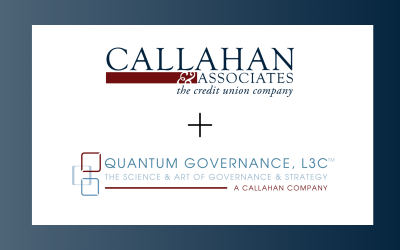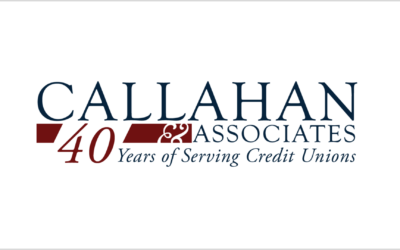Insights From Callahan Consultant, Chris Howard
There’s a growing — albeit misguided — distrust of credit unions today, making effective governance more important than ever … and harder than ever.
At its core, good governance is fairly simple, although never easy. The keys to good governance are to understand what the job is (and what the job is not); to show up, be prepared, and participate constructively; and to check your egos at the door.
I’ve written a lot on CreditUnions.com about the obligations and challenges of good governance, and every year Callahan & Associates works with scores of credit unions on issues of practical governance. Management oversight is invariably the area of greatest concern and focus, but it’s only one job among many.
Here are a few fundamentals that might be less obvious but are arguably just as important. Do these jobs well, and you empower management to excel — making its oversight the easiest governance task of all.
1. You are not your member.
Governance is the representation of member-owners and their interests. To do that effectively, you, as board members, should start by acknowledging you are different from the bulk of the credit union’s membership. You are probably older, wealthier, better educated, and more financially sophisticated. You have different life experiences and have more leisure time; otherwise, you wouldn’t have the bandwidth to be a director. Your interests and expectations will be different as well. Your job is to serve the memberships’ needs, interests, expectations, and life circumstances, not your own.
2. Your primary job is about tomorrow, not today.
The board hires professionals to manage the day-to-day and also help prepare for the future. Ultimately, however, it is the board that articulates why the credit union exists, defines goals and aspirations, and sets the course for getting from where it is today to where it wants to be in the future. That’s strategy. It’s a responsibility the board and management share, but only the board can ensure the credit union’s purpose and aspirations are appropriate, actionable, achievable, and impactful, and only the board can ensure management has the resources, authority, and ability to achieve them.
3. Purpose must be more than a pretty word.
In a mission-driven industry, purpose needs to do more than motivate, energize, inspire, and unite. To deliver on its promise, purpose needs to be actionable. It needs to engage and impact stakeholders constructively and materially. It needs to be integrated into the balance sheet and income statement. It needs to shape the credit union’s products and services and deliver results that are measurable, measured, tracked, and communicated.
4. Always speak with one voice.
This is a key success factor for board governance at any level, in any organization, and no matter the scope of responsibilities. It should be non-negotiable. In the boardroom, skepticism and constructive conflict are not only acceptable but often desirable; however, when the meeting ends, so must all debate. No exceptions. Regardless of what goes on in those meetings, unity and clarity of message is mandatory in public. Nothing legal is less ethical than airing dirty laundry in public. It undermines the cooperative and stifles good governance. Directors have an absolute duty of loyalty and care. Speaking with one voice is the epitome of these most basic obligations.
5. Know your boundaries.
The board’s job is critical and is fundamentally different from management’s job. Boards hire professionals to run the credit union. Let them do it. Stay out of the weeds. Stay away from delinquencies. Don’t get involved in personnel decisions. Boards must focus on managing themselves, meeting the responsibilities specific to them, and making sure their institution is moving, safely and sustainably, in the direction they set. Boards can’t do this if they are distracted by trying to do management’s job. Supervision by looking over management’s shoulder is bad governance.
Bonus: Manage risk, don’t avoid it.
Establishing a reasonable risk appetite, with the advice and cooperation of management, is another job that only the board can do. Good governance means going beyond just signing off on executive recommendations. It’s imperative board members understand the risks the credit union is taking, what board members intend to accomplish by the credit union taking them, and how the credit union intends to manage them. Despite the apparent belief of all too many examiners, credit unions are in the risk management and mitigation business, NOT the risk avoidance business. Setting the parameters to do that is one more simple, but difficult, governance responsibility.
Good governance is active, not passive, but it’s also permissive toward management. Constructive action and positive impact are the product of a board engaged in servant leadership, the true calling of a Class A board. The best boards validate the reasons their credit union exists, empower the team they’ve hired to achieve that purpose, and back management when it comes time to execute. Of course, good boards take responsibility and action when their management team fails to perform, but for the best boards, that’s not an issue.
Sustainable Success Through Strategic Governance
Chris is a consultant at Callahan & Associates. Looking for an outside perspective to facilitate your board meetings or strategic planning? Let’s connect.
More Blogs
Callahan & Associates And Quantum Governance, L3C™ Unite to Advance Credit Union Governance
Callahan & Associates, a leading provider in performance measurement, leadership development, strategic advisory, and community development for credit unions, is excited to announce the acquisition of Quantum Governance, a nationally recognized consulting firm specializing in governance and strategy.
Tips To Make A Core Conversion Easier
Best practices for credit union core conversions.
Accessible Financial Services Matter More Than Ever
For millions of Americans, accessible financial services remain out of reach. In St. Louis, MO, Alltru FCU is changing that.
How To Use Credit Union Marketing Personas To Deepen Relationships
Rich knowledge of member behavior helps Solarity Credit Union segment its membership, create useful credit union marketing personas, and focus on deepening engagement.
How To Benchmark Credit Union Performance Against The Economy
Credit union executives and finance leaders face an increasingly complex task: explaining financial performance in a way that is both accurate and actionable. Traditional benchmarking approaches focus on two perspectives: Internal Trends – How your own institution’s...
Why Who You Benchmark Performance Against Matters More Than You Think
Too often, benchmarking is treated as a scorecard — a way to check performance against peers for board prep, audits, or strategic planning discussions. But the choice of peer group matters, it can help you tell a more complete story about your credit union’s performance and validate strategic decisions.
Why “Jobs To Be Done” Should Be At The Core Of Every Credit Union’s Strategy
Over the past decade, Callahan & Associates has worked closely with credit union leadership teams across the country to help them approach innovation and think more strategically about how they serve their members. A key part of this work has been rooted in...
Great Lakes Credit Union Featured In Callahan & Associates’ “Anatomy Of A Credit Union”
Washington, DC – Great Lakes Credit Union (GLCU) has been featured in the Spring 2025 edition of Callahan & Associates’ “Anatomy Of A Credit Union” series, which highlights exemplary credit unions demonstrating strategic innovation and community impact. The...
Callahan & Associates Celebrates 40 Years Of Credit Union Impact
Washington, DC – On April 1st, 2025, Callahan & Associates proudly marks its 40th anniversary, celebrating four decades of innovation, leadership, and commitment to serving the credit union industry. Since its founding in 1985, Callahan has been at the forefront...
Expertise Matters. Be The Partner Clients Trust.
For credit union suppliers to be considered indispensable, it’s more important than ever to know their clients' and prospects' businesses inside and out. Credit unions are looking for more than just basic products and services from their suppliers – they need partners...











